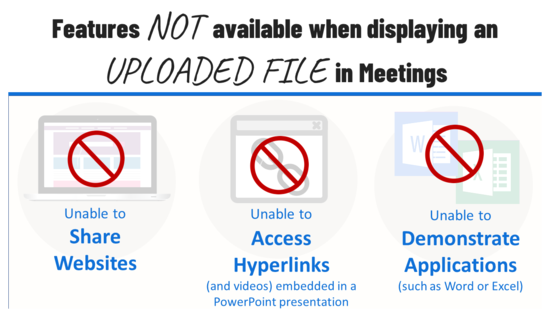Difference between revisions of "Meetings: Presenter Features"
From DurhamtechWiki
Jump to navigationJump to search| Line 46: | Line 46: | ||
<li>Moving from sharing your screen back to the Meetings session (to return to your presentation or manage users)</li> | <li>Moving from sharing your screen back to the Meetings session (to return to your presentation or manage users)</li> | ||
</ul></big> | </ul></big> | ||
| − | + | ===Instructional Tips=== | |
| − | + | To learn more about how you can implement lower and higher bandwidth activities, visit our [[Meetings: Instructional Tips|Meetings Instructional Tips]] page. | |
| − | |||
| − | |||
| − | |||
| − | |||
| − | |||
| − | |||
| − | |||
| − | |||
| − | |||
| − | |||
| − | |||
| − | |||
| − | |||
| − | |||
| − | |||
| − | |||
| − | |||
| − | |||
| − | |||
| − | |||
| − | |||
| − | |||
| − | |||
| − | |||
| − | |||
| − | |||
| − | |||
| − | |||
| − | |||
| − | [[ | ||
| − | |||
| − | |||
| − | |||
Revision as of 16:31, 12 November 2020
The Presenter has the option to upload files for display during the session, as well as the ability to screenshare. However, both options cannot be performed at the same time, so the Presenter must plan ahead to determine which option will best suit the session’s activities. Consider your bandwidth connection when planning your Meetings activities.

Contents
Presenter Activities
Activities Suitable for BOTH Lower and Higher Bandwidth Connections
- Upload a Presentation (and upload multiple files and enable user download during the session)
- Start a poll
- Use smart slides (PowerPoint slides created before the session)
- Custom Polling (during the session)
- Polling verbally
- Share an external video
- Users and Instructors can:
Instructional Tips
- Save your Word documents and PowerPoint presentations as PDFs before uploading them to Meetings. This will reduce the amount of time Meetings will need to process and covert your file(s).
- Several Meetings features are unavailable when you choose to display an uploaded file. You will be unable to:
Screensharing (Higher Bandwidth ONLY)
If you want to share your desktop to display websites or software applications that are located on your computer, you will need to share your screen.
To successfully share your screen, you MUST use Chrome or Firefox and NOT a mobile device.
- Share your screen to view a website or demonstrate an application
- Using Chrome web browser
(Choose: “Your Entire Screen” ) - Using Firefox web browser
(Choose “Entire Screen” [the last option] to share your screen OR you can share a specific web browser tab or a specific application application) - https://support.blindsidenetworks.com/hc/en-us/articles/360025276251-Share-my-screen#h_12864300-45a0-422f-9039-f54151d1d0d1 What do you see in the presentation area when you start screensharing? (Click on link and scroll down)]
- Using Chrome web browser
- Ending your screenshare
- Moving from sharing your screen back to the Meetings session (to return to your presentation or manage users)
Instructional Tips
To learn more about how you can implement lower and higher bandwidth activities, visit our Meetings Instructional Tips page.
